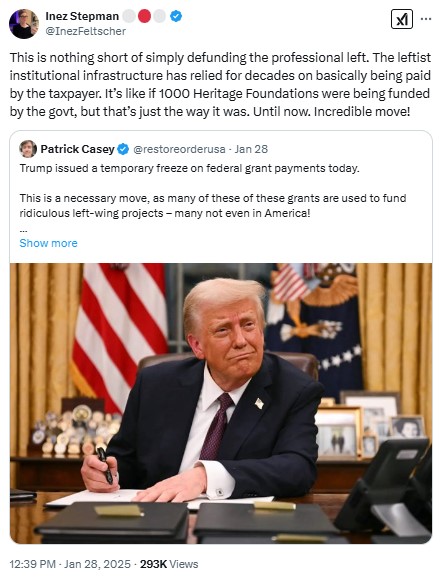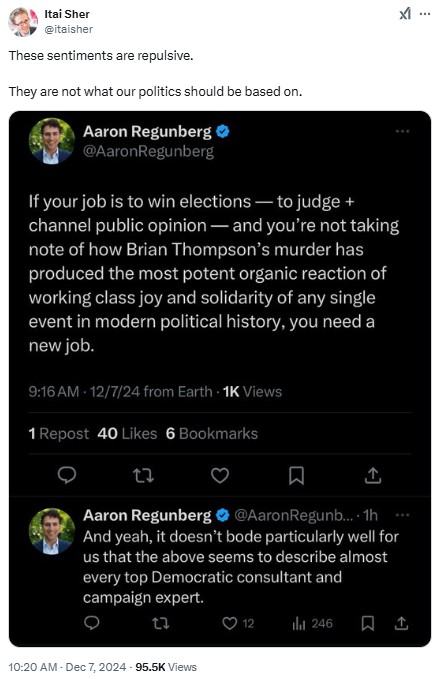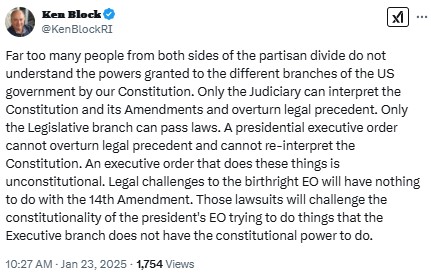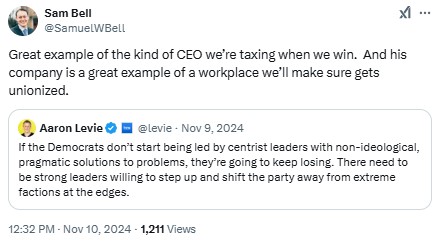This observation points to a useful exercise for all citizens:
A useful exercise is to keep a look out when news stories at the state or even local level mention some organization. Do a little research into their history and funding. Rhode Island has about a million people and a long-languishing economy, yet even on relatively niche issues you’ll find multiple advocacy organizations with the funding and compensation of a healthy small business.
[Open full post]This is, let’s just say, a reasonable thing to wonder:
It may have long been the case that federal grants were a major financing scheme for left-wing organizations, but the Obama administration amplified it, flooding the market and giving us much of the confusion and turmoil of the last decade.
Objectively, one can say that Democrats are the party of government and progressives place government centrally in their ideology. Therefor, the current state of affairs was probably inevitable — that accepting grant-making as a legitimate government function left up to bureaucrats to dole out would lead to a one-sided funding mechanism.
After all, even as far back as Thomas Jefferson’s time in office, the executive created no-show jobs for helpful allies (like newspaper men). At least back then, however, the feds couldn’t afford to hand out comfortable salaries by means of such corruption.
[Open full post]… I remind myself that Aaron Regunberg was very nearly governor. A lot has happened since this tweet, so as a reminder, Brian Thompson was the healthcare CEO murdered in cold blood in New York:
[Open full post]One sees people take positions of similar structure to Ken Block’s, here, on many issues, from immigration to finance to healthcare to science:
One of humanity’s great advantages is that we can divide the labor of understanding. One person figures something out, and others can build on his or her conclusions without necessarily repeating all the difficult cognitive work the discoverer has done. The problem is that people sometimes overstate the confidence and reach of their conclusions, especially when it comes to the law.
Going to court is expensive, time consuming, and risky, so wherever possible, people try to interpret past findings to understand make educated guesses about future ones. In this case, the precedent left a gray area between “children born of alien enemies during a hostile occupation” and children born to legal immigrants who haven’t yet become citizens. Many of us would tend to think mothers who knowingly enter our country in contravention if its laws are demonstrating that they do not consider themselves subject to its jurisdiction (which is the tricky phrase in the Constitution).
An administrative agency (to wit, the President) could therefore do as Donald Trump has done and put down a marker, and somebody with standing to sue can bring it to the courts if he or she disagrees. Unfortunately, our government has become such that this would end in the Supreme Court’s deciding the true meaning of the words and potentially thereby making new laws by amending what the drafters of the law intended. It would be healthier if the court found that the language did not provide sufficient grounds to decree a resolution definitively from the bench and left it to executive interpretation until such time as Congress and the People of the United States clarified the underlying law.
[Open full post]Here is Senator Bell’s response, back in November, to the CEO of Box.com, who offered a mild, moderate suggestion for Democrats after the election:
Bell exposes two important things, with this Tweet. First, a significant portion of Rhode Island’s Democrat power elite are happy to ride the state into utter, Venezuelan devastation for the sake of ideological purity. Most of us understand the idea of states as testing grounds for different ideas means that states that choose poorly will learn from those that choose well, but for fanatics like Bell, the drive is to control a state simply for the sake of imposing their ideology for the ideology’s sake.
Second, Bell’s ideology is about hurting people he doesn’t like. He excuses it for himself by insisting the reason he doesn’t like them is they harm others, but that’s a screen. The ego boost of power over others (probably out of envy) is the fundamental motivation.
[Open full post]On WNRI 1380 AM/95.1 FM, John DePetro and Justin Katz discuss:
- Did Trump freeze the Washington Bridge?
- Do the progressives own Providence and/or speak for the Democrats?
- Are Neronha and other RI officials really representing Rhode Islanders acting as partisan activists?
- Are ballooning expenses for emergency housing the very point of the government plantation approach?
- Should Sandra Cano have counted on the Democrats’ golden escalator into D.C.?
Featured image by Justin Katz using Dall-E 3.
[Open full post]It’s from October, but this argument from Vice President Vance against the view that nobody will build houses except illegals is worth revisiting:
“This is one of the really deranged things that I think illegal immigration does to our society is it gets us in a mind-set of saying we can only build houses with illegal immigrants, when we have seven million — just men, not even women, just men — who have completely dropped out of the labor force. People say, well, Americans won’t do those jobs. Americans won’t do those jobs for below-the-table wages. They won’t do those jobs for non-living wages. But people will do those jobs, they will just do those jobs at certain wages,” Vance said.
A necessary addition — perhaps a deeper cause — is cultural. We need to stop giving American workers the impression that it’s good enough to be made a client for government services or to work some menial minimum-wage job that was never meant to support a family. Instead, we need to reinvigorate the sense of the value of producing things and working hard. Of course I needed to support my family, but the greatest compensation from my years in construction was the feeling of having worked hard and created something that hadn’t been there when I started.
Beneath it all is a character issue. Government policy has oversimplified our thinking about employment to treat it is as merely a financial exchange, and always sufficient to support a whole family.
To the contrary, employment policy should mostly stay out of the way, but to the extent it has an effect, it should foster the human drive that moves from miniscule pay for menial tasks through rewarding exertion to success through skill and wisdom.
[Open full post]On WNRI 1380 AM/95.1 FM, John DePetro and Justin Katz discuss:
- The state of McKee’s speech
- The fed-dependent governor snubs inauguration
- Symbolic Constitutional infringement with budget weapons ban
- The missing element of the RIGOP’s response
- An unfavorable McKee
- An unfit Biden
- RI last for starting a business (again)
Featured image by Justin Katz using Dall-E 40 and Photoshop AI.
[Open full post]The Senate hearing on President-Elect Trump’s nomination of Pete Hegseth for Secretary of Defense is now underway. Inasmuch as the objections to his nomination raised so far at the hearing are irrelevant to the vital mission of the United States military, I am bumping up my post of November 17.
There has been a “Well I Swan” reaction this week in certain quarters to President-Elect Donald Trump’s choice for Secretary of Defense. The big concerns seem to be that Pete Hegseth is a Fox News host; that he lacks
defense policy experience or foreign policy chops
that he has certain tattoos; and – oh, hey, the Washington Post just found out that he entered into a settlement with a woman last year over an allegation of sexual assault in 2017.
Side bar: Hegseth was not arrested or charged with a crime. Accordingly, can a #MeToo advocate please clarify in this case whether we should “Believe All Women” or … well, not?
Back to the main subject. The sole focus of an organization needs to be its mission. In the case of the US military, the mission is national defense. To carry that out under the dangerous, high stress condition of combat, unit preparedness and cohesiveness has to be the sole focus to the exclusion of everything else – especially irrelevant, downright damaging elements such as political correctness and marginal, radical pop culture fads.
The Biden/Harris administration, preceded by the Obama/Biden administration, has imbued the US military with a significant component of the latter, thereby jeopardizing troop readiness and national defense.
The introduction to the US military of aspects that are distractive from and actually harmful to its mission has its foundation in the gauzy, perilous delusions of recent years.
Boys can (and should) be turned into girls and vice versa. Open borders are fine and have no cost, human or financial. Violent criminals above victims and justice. Shutting down reliable energy sources for intermittent, unready sources will work out just fine.
All of this is obviously wrong on its face. Now there is an attempt to add to the list: a military distracted and diverted from its mission can provide a robust national defense.
The situation has devolved to the point that what would have ordinarily been important factors in the choice for Secretary of Defense – his/her defense and foreign policy experience – are now secondary because we need to return the US military to basics.
Peter Hegseth has advocated strongly for this: a return to a focus on the mission.
For the country’s national defense and to maximize the safety of our valued troops, this needs to happen and happen quickly.
In short, Hegseth and President Trump are correct: the United States military needs warriors, not culture warriors.
[Image by Pixabay via Pexels]
[Open full post]










